Uqba bin Nafie Al-Fihri, between gossip, truth and fiction
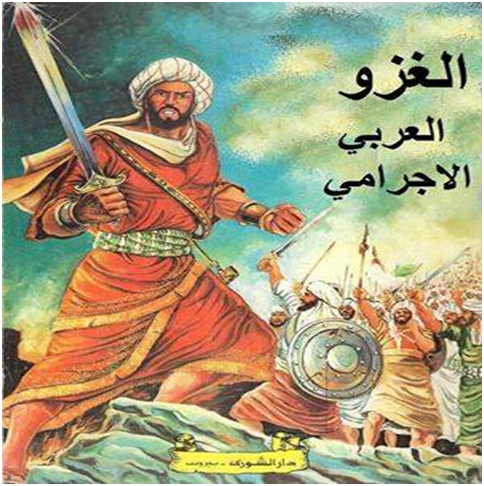
The worship of heroes and their industry is a feature accompanying the eras of backwardness in which the mind took its open permission, hence the current Salafi-Wahhabi thought that dominates the hearts of gullible Muslims to restore the reverence for the predecessors in its heritage, as it is the correct one in Islam, and every discussion of it is considered misguidance and blasphemy without resorting to the explicit verses of the Qur’an in command.Hence, the concern for the Fihri leader Uqba bin Nafeh, who is in his reality a human being like us, in him everything that is in us of weakness and strength, injustice and justice, in him right and wrong, in him dreaming and arbitrariness, in him selfishness and selfishness, in him altruism and exclusivity, but some historians made him an angel not Falsehood comes to him from before him or from behind him, and they did not leave a noble cause except that they mentioned it and added to it from the fabric of their imagination that which neither reason nor logic can accept, and the historical truth is relative in which truth and lies are permissible, and the news of an obstacle that has no sanctity in it because it is not in the Qur’an, nor is it one of its facts. The matter is that it is from the news of the narrators and the history, so everything that is said about him comes out of the framework of sacredness, and enters the framework of historical research and investigation.
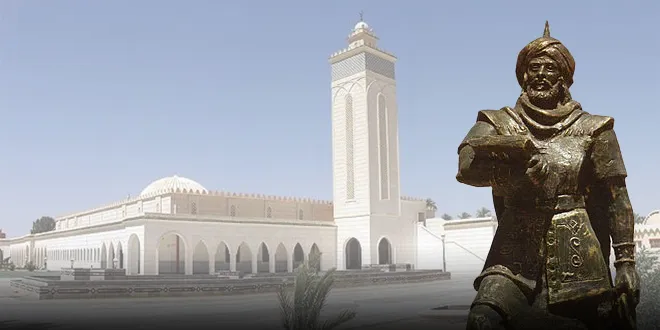
?Who is Uqba bin Nafie
Raising his hand to God supplicating and saying: [O Lord. Were it not that the sea prevented me, I would have gone through the country to the path of Dhul-Qarnayn, defending your religion, fighting those who disbelieved in you.] [1]. Anyone who follows the history of the Arab invasion of North Africa, and the history of the two campaigns of Uqba bin Nafeh al-Fihri in particular, discovers some aspects from them that must be examined in order to weigh their implications and dimensions.
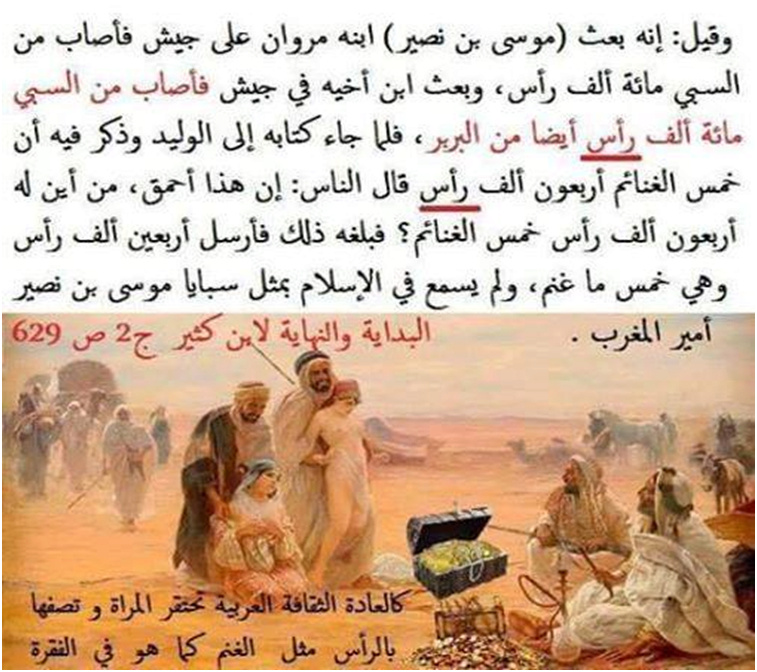
Between the history of politics and the history of the country and society
The fact that the history of a homeland was reduced to military figures was revealed, surrounded by an aura of sanctification drawn by the pen of a creative historian in whom passions played a great way, and it became a cloned reference that no one was able to alert to the place of imbalance and slander in it, so the rehashing of lies led to demarcating it and placing it in the ranks of facts that there is no room for denying it. And every attempt to cast doubt is a form of denial and falsification, which is confronted with verses of disobedience, misguidance and disbelief, which are things that curb the course of research and prevent its launch according to a correct methodology that looks at society in its inclusiveness without reducing its effort, genius, struggles and innovations by dwarfing and obscuring, and summarizing it in the virtues of one central figure as the center. The knot and the millstone, around which events revolve, within a historical pattern that neglects action and emotion, and despises those who are motivated by a religious motive, considering them to be infidels in whom offensive jihad is permissible with flimsy justifications that reason, logic, and sound religion proved to be invalid, and this is what happened to our history during the era of the figure of Uqbat al-Fatih during the fifties of the century.The first is migration, which is what makes the sources of Islamic history tend in general to be a record of the virtues of the caliphs, ministers, and leaders of the invasion, as for the rest of the nations, peoples, and subjects, they are dependents of whom no mention is made except by accident, and they are forced to revolve around the aura of rulers and politicians and those who surround them and serve them. Jurisprudence, such as the pilgrims turning around the Kaaba.
Myth in Islamic history

The examiner of the source facts reads, for example:
- The gushing of water under the feet of the mare of Uqbah after his call to God, after his army was exposed to thirst while trying to circumvent the fortified city of Khawar, so the soldiers quenched, after their leader ordered them to dig more than seventy holes, from which water came out successively. Inspiration for what happened in the story of our master Ismail and his mother Hagar between Safa and Marwah, and what accompanied that from the gushing of water under the feet of the Prophet, our master Ismail, peace be upon him, or what is known as the well of / Zam / Zam
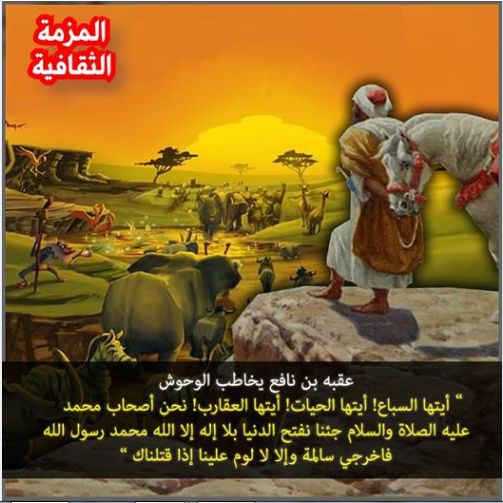
- His call for the exodus of beasts and beasts from the site to be built in the city of Kairouan (that Uqba bin Nafi invaded Africa and came to the valley of Kairouan, so he and his companions spent the night on it, until in the morning he stood at the head of the valley and said: Obey, for we are descending. It is known from the animals, they go out and they look at it from the morning until the sun hurts them and they did not see anything from it [1]. And the spread of smoke that necessarily leads to the departure of wild animals in all their forms and types from the site for fear of perishing
- And in his story about the matter of determining the qiblah of the Kairouan mosque, there is a reference to the effort of the soul in correcting it, when he saw the issue of the difference of companions in determining it, so he became distressed, so he prayed to God for relief, so a person came to him in his sleep, saying to him: “If it becomes morning, take the flag in your hand …. You hear a takbeer in front of you that none of the Muslims can hear except you, so look at the place where the takbeer is cut off from you, for it is your qiblah and your sanctuary! ....so he woke up in his sleep and he was alarmed.. . And after his prayer, the two rak’ahs of the morning prayer with the Muslims, when he said the takbeer in front of him, he said to those around him (Do you hear what I hear?) They said (No), so he knew that the command was from God, etc. “[2] And the follower of what was said becomes clear the extent of the dramatic graduation of the issue, and the extent of the strength of people’s faith, past and present With dreams and fantasies, just as our leader receives divine inspiration, like the prophets, guiding him to determine the place of the mihrab and the qiblah? And how can the Bedouins invade eastern and western countries who do not know how to identify the four directions? And they are incapable of their civilization determining the features of the east and the qiblah? And people who preceded them, the matter of determining the directions was not difficult and did not require God’s intervention in determining it, and the story may be inspired by the legends of the ancients who had bright minds that formulate legends in order to get close to the people of the solution and the contract. The ruling class has reached the limit of falsification and distortion of facts, as stated by the official historian of the Buyid state when he was asked about what he was doing.
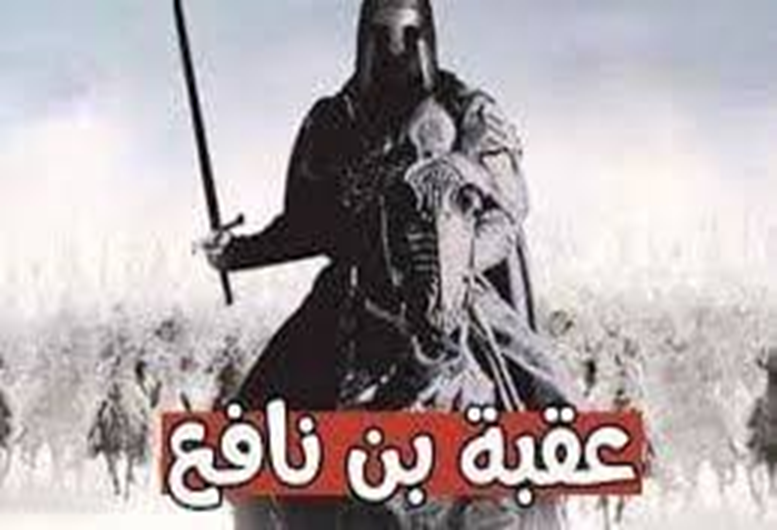
Jihad and fighting perspectives attack and defense
To overlook the mention of the illegality of offensive jihad and indiscriminate and intimidating killing is “Fight in the cause of God those who fight you, and do not transgress, for God does not love the transgressors.” “So whoever transgresses against you, transgression against him in the same way as he transgressed against you, and fear God: Al-Baqara 190, 194.” And blurring the facts About the real reactions to the process of expansion and spreading Islam, and the actual position of the Amazighs regarding the wide sweeping operation carried out by Jund al-Islam under the leadership of Uqba, in which we read nothing but murderous phrases that highlight the horror of what was committed in the name of Islam, whose teachings were trampled with stinking patches of worldly teachings from the house of the Umayyad Caliphate With its content, which aims to achieve more (tribute, tribute, and African captivity). The Muslim Arab invader and those who were with them from the Zanata tribes did not ask themselves about the extent of the permissibility of assaulting the other, even if he was an infidel, for all he wanted was oppression, killing and intimidation to subdue people’s necks. If you only want to be a tyrant in the land, and you do not want to be one of the reformers” [5], then do not read in the heritage books except “... so he defeated them and killed them, and the Muslims took a lot from their captives and horses, …. so he fought them with a terrible fight …. So they exterminated them and cut off their traces, …. And Ogl (Aqaba) in the West kills and captures nation after nation, and sect after sect,…. And his invasion (Aqaba) also to the Berbers with the lower Sous, and it is in the country of Tamesna, which is the country of the steadfast, so he defeated them and annihilated them, and (Aqaba) spread the horses in their country, so they separated in their search to every place they fled to, so no one pushes them. So (Uqba) killed them in a fight that the people of Morocco had never heard of, until (Uqba) defeated them and killed a great character among them, and he struck women among them that people had not seen in the world the like of them. The tribes that had previously converted to Islam, and Ibn Abd al-Hakam mentions in the history of the conquests of North Africa and Andalusia that the tip of the trunk of the nose of a king (Wadan) said: Why did you do this to me and you promised me? Uqba said to him: I did this to you out of politeness, and if I touched your ear I mentioned him, so why did you fight the Arabs?

The matter is in the prevailing of the culture of coercion and coercion, which contradicts the essence of Islam, which means peace, and where is the Almighty’s saying, “There is no compulsion in religion”?
These facts highlight the extent of Islamic tolerance towards the people of dhimma and the infidels, and is fighting for the sake of God? Or for the sake of favor and power? Is fighting and jihad restricted to the Muslim and not to the infidel? That is, it is lawful for Muslims and forbidden for infidels.
And what was the fault of those who were killed on both sides, and they did nothing but what God commanded to do if they defended or pretended to do so, (So whoever assaults you, assault him in the same way as he assaulted you, and fear God), and as long as the Muslim is the aggressor, then he deserves to be reciprocated, and God described them That they did not fear God because they carried out aggression? Or does God Almighty permit and order fighting the infidels without a valid reason, and He is able to make the whole world safe if He wills, without His need for the violence of al-Hajjaj ibn Yusuf, and there is no fighting and jihad as an obstacle, and He is the one who said (So whoever God wants to guide He opens his chest to Islam and whoever he wants to mislead He makes his chest narrow and uncomfortable, as if he ascends into the sky.)
[7] He also said (And if your Lord had willed, He would have made the people one nation and they would not cease to differ) [8]
Then we ask about the extent of the Arabs' effort to convey the message peacefully before the start of the invasion, and it is the right of these Amazigh people to know the truth of the matter and to find out from it, so that this will be an argument and justification for the Muslims in the attack on their homeland, then will faith be straightened and belief will be established with swords on heads and necks?
This is what was mentioned about the invasion. As for what was said about the practices of the invaders and their transgressions, the Berbers did not know them until the days of the unjust Roman rule, and it may not be true to talk about that. In the midst of these realities, a person wonders whether Islam came to liberate peoples or to kill, destroy, subjugate and shackle them, and to train the rest of them to submit according to the doctrine of fatalism, which is entrenched among many people of the religion, in response to the prohibition and prohibition of departing from the authority, even if it was one of the tyrants, oppressors and deviants.
Between Uqba bin Nafie and Axel and Abu Al-Mahjar Dinar is a lesson
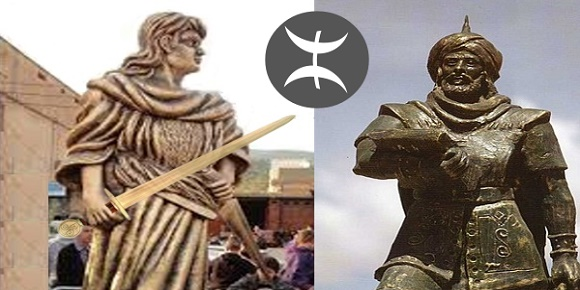
So Uqbah was restored to his position, and upon his arrival he bound his rival, Abu al-Muhajir Dinar, and his companion Axel with shackles, and he destroyed Kairouan, Abu al-Muhajir who built it, and returned the people to his first Kairouan, and kept his captives in iron, moving them with them in his conquests. She was not used to dealing with prisoners, especially if they were kings, and it is clear from what was mentioned, and the sources remind him that the rivalry aggravated and broke out between the two men, especially after the Arab Muslims disapproved of calling him, What do you do, O barbarian? Despite Aba Al-Muhajir advising Aqaba about Axel’s policy, he said: “What an evil thing you have done!
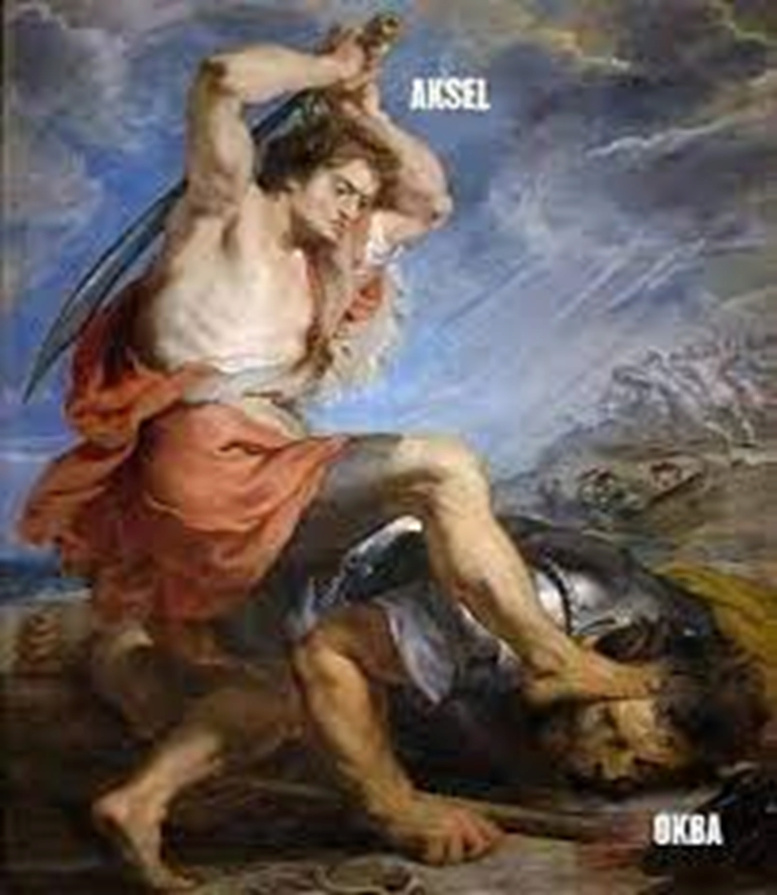
Fairness is that the man defended his honor and the honor of the nation to which he belongs, and the land that sheltered his ancestors in the face of the arrogance and tyranny of the Umayyads in the name of Islam [the leaders on the religion of their kings]. It is our right, the Amazigh community, to be proud of Axel to the same extent that the Arabs are proud of Aqaba. The first fought for his homeland and the honor of his nation that he represents, and the second fought and struggled for the sake of empowering the Arabs and those who supported them, because jihad for the sake of God does not require aggression, killing, plundering, captivity, and the empowerment of the world, and both jihads have their reward. With God, (And if your Lord had willed, He would have made the people one nation and they would not cease to differ) [11]

The epitome of saying
The sanctity imposed by the predecessors on the mujahideen invaders is a voluntary setback for free thought, and a disruption of historical research that distances itself from all restrictions and shackles. It is here in order to discover the truth, albeit relatively, and to fight the falsehood that affected it, and the distortion, falsification and crookedness of history, and the truth alone is capable of dispelling the veils and revealing the hidden and hidden from our history, which they made the history of individuals and families, the history of regression and backwardness, the history of priesthood and clerics, not the history of nations and peoples, searching for themselves a place and a seat in the theater of the nations of the world, and if telling the truth and the truth is relative, then no one knows All truth, God is the only knower of all truth.
Tayeb Ait Hammouda
Margins:
[1] Ibn Ithari al-Marrakshi, Al-Bayan al-Maghrib..., vol. 1, p. 27
[2] The previous source, part 1, p. 31 -
[3] Muhammad Abed Al-Jabri, p. 32,
[4] The calumnies of Al-Mahdi Ibn Tumart, the founder of the Almohad state, in deceiving the gullible of his people,
[5] - Surah Al-Qasas, verse 19.
[6] - Excerpts from the book of Ibn Ithari al-Marrakshi, Al-Bayan al-Maghrib Vol. 1, pg. 34...37,
[7] - Surah Al-An’am, verse 125
[8] - Surah Hud verse 118,
[9] - Ibn Ithari al-Marrakshi, Al-Bayan al-Maghrib..., vol. 1, p. 22,
[10] - Abd al-Rahman Ibn Khaldun, Book of Lessons, Vol. 2, p. 10, Duslan
[11]- Surah [Hud, verse 118
Source: websites

